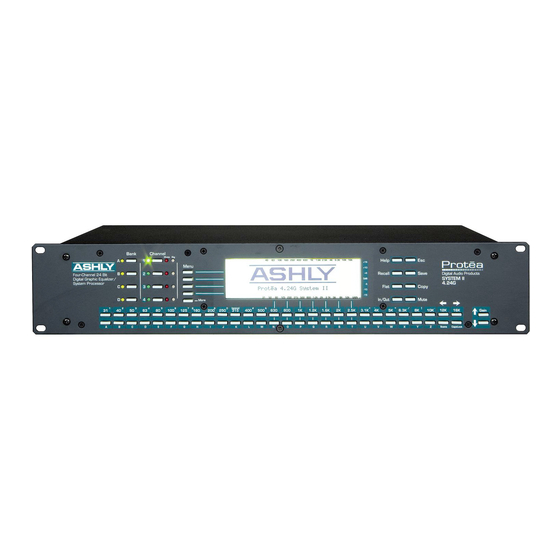- ページ 12
録音機器 Ashly Protea System II 2.24GSのPDF 取扱説明書をオンラインで閲覧またはダウンロードできます。Ashly Protea System II 2.24GS 20 ページ。 Two/four channel graphic/parametric equalizer/system processor, full function graphic equalizer remote control
Ashly Protea System II 2.24GS にも: テクニカルノートと仕様 (2 ページ)

Operating Manual - PROTEA SYSTEM II Digital Audio Products
400 630
1K
1.6K 2.5K 4K 6.3K 10K 16K
15 500 800 1.2K 2K
3.1K 5K
8K 12K
1K
1.2K
1.6K
2K
2.5K
P
Q
R
S
5.7 SAVE
To permanently store the settings of the current channel to a preset, press SAVE. The screen first prompts for
a preset number, defaulting to the currently loaded preset. Numerical entry can be done with the up/down keys or by
typing in numbers on the keyboard.
Pressing SAVE a second time prompts for the user to give the preset a name, although it is not required. Text
can be either upper or lower case, and is toggled with the CapsLock key. Pressing SAVE a third time writes the current
settings, preset name, and preset number to memory.
5.8 FLAT
In the EQ screen, pressing the FLAT key quickly returns all faders to 0dB for beginning a new EQ curve.
(Individual EQ frequencies can be "zeroed" by pressing both up and down keys simultaneously.) In the HPF/LPF
screen, the FLAT key resets the two filter frequencies to "off".
5.9 COPY
To quickly copy the settings of the current channel to another channel, press the COPY key. You will be
prompted to enter a target channel. Press the desired Channel number key (and perhaps the Bank key, if applicable)
that you want to copy to, then press COPY again to execute the copy, or ESC to exit.
Note: The new channel which was copied to becomes the current channel, and although the new channel's
preset name and number remain the same, the audio settings are now that of the channel from which the copy was just
made. Unless it is saved however, no permanent changes are made to the preset formerly loaded to the new current
channel. This feature is an easy way to copy settings from one channel to another without changing the preset name.
5.10 IN/OUT
Each of the four audio functions in the first menu (EQ, Limiter, HP/LPF, & Delay) can be switched in or out inde-
pendently of one another. The IN/OUT key will only affect the audio function selected on the current channel's menu.
5.11 MUTE
Local Mute: The MUTE key turns off the currently selected local channel. A red LED is lit to the right of
any channel which has been muted. If local channels are linked together, pressing MUTE on the dominant channel
will also mute the dependent channels. Local mute overrides a system mute
Remote Mute: Any MIDI channel can be muted from the remote control. Because of the limitations of MIDI
however, only the Current Channel can display its mute status. The other three channels' mute LEDs will remain off
on the remote, even if those channels are locally muted. This also applies to a 4.24G used as a Master device (Banks
B-D).
Slave Mute: Slave channels can be muted through external control, and indicate mute status by flashing the
MIDI Channel display on and off for the muted channels.
12
Help
+15
+10
Recall
+5
0dB
-5
Flat
-10
-15
GAIN
In/Out
-
+
*
3.1K
4K
5K
6.3K
T
U
V
W
X
Esc
Save
Digital Audio Products
SYSTEM II
4.24G
Copy
Mute
.
/
!
8K
10K
12K
16K
Y
Z
Scene
CapsLock
Gain
